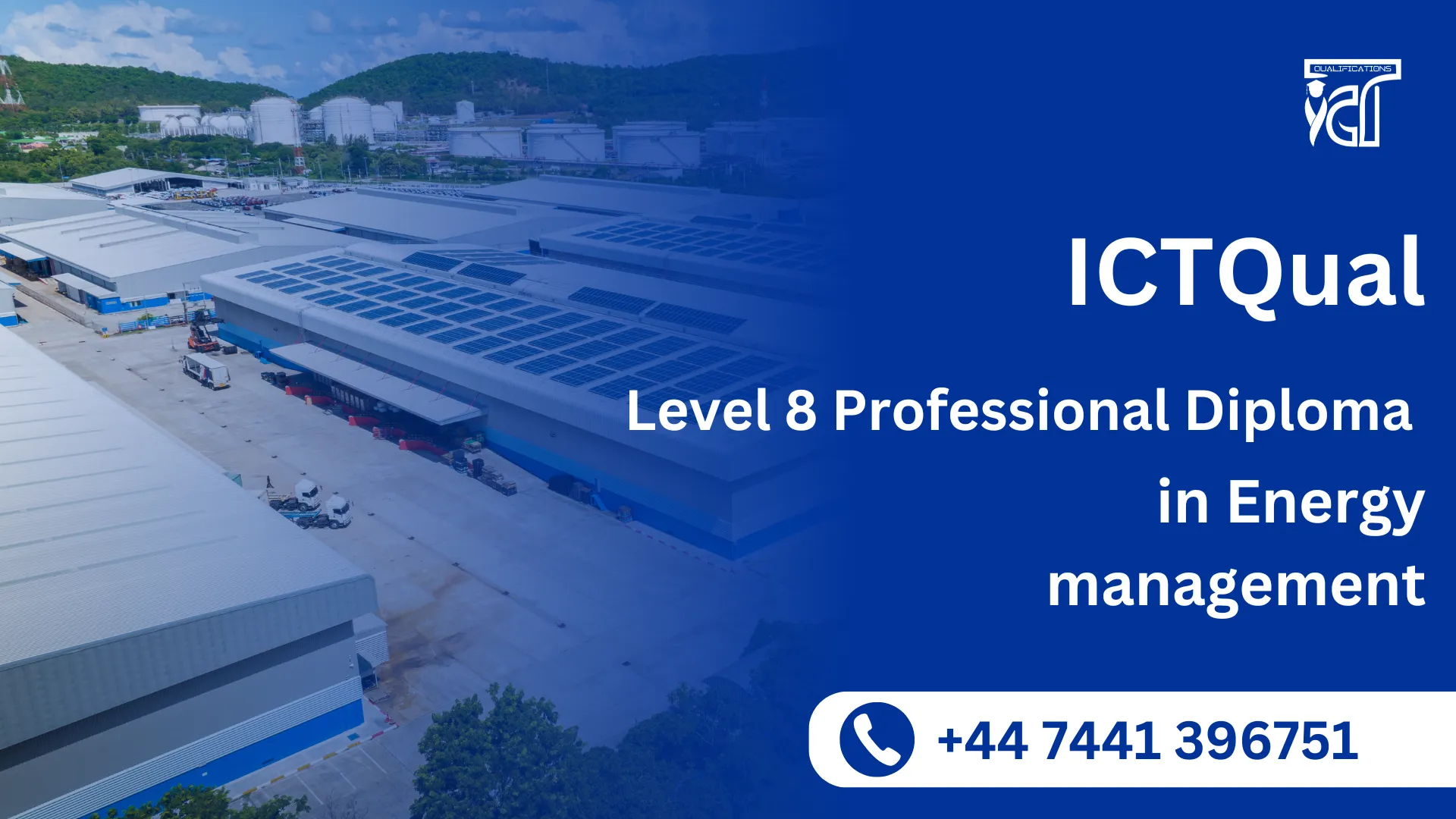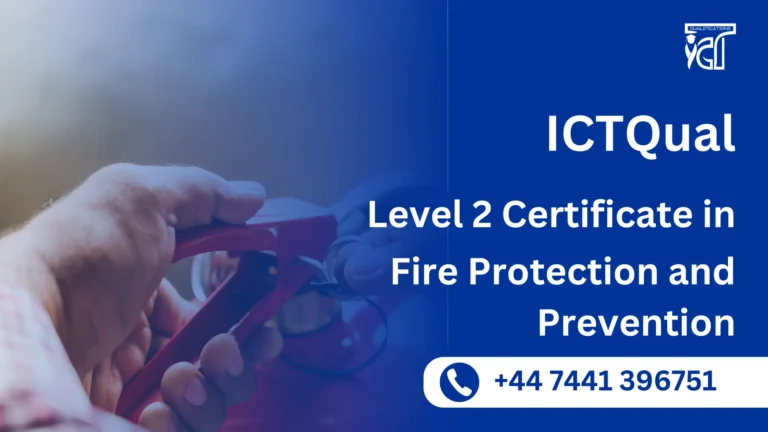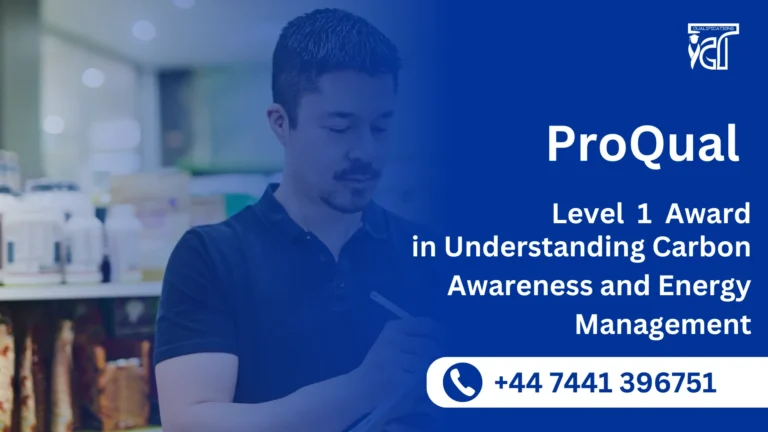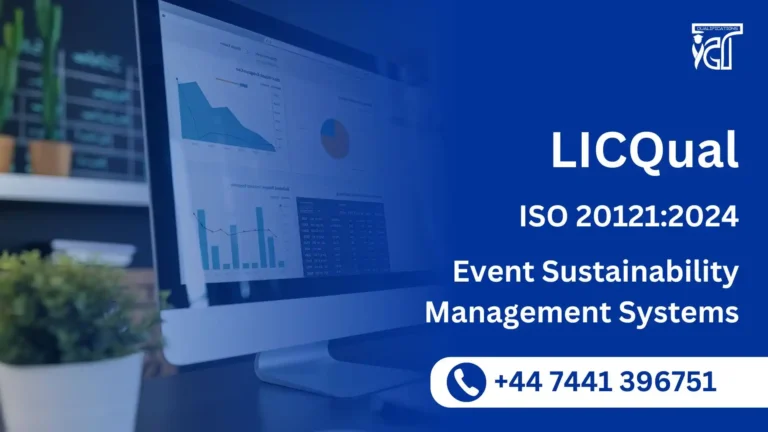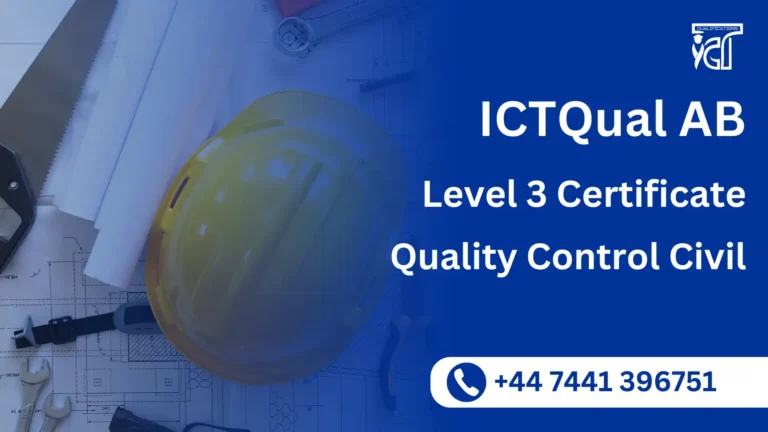As the global focus on sustainability and energy efficiency continues to grow, professionals who are skilled in energy management are in high demand. The ICTQual Level 8 Professional Diploma in Energy Management is designed to equip individuals with the advanced knowledge and practical skills necessary to lead energy management initiatives, implement energy-saving strategies, and promote sustainable practices across industries.
This qualification is ideal for those seeking to enhance their careers in energy management, whether you’re already in a related field or aiming to transition into a senior energy management role. With a global recognition and a focus on practical, real-world applications, the ICTQual Level 8 Diploma ensures you are prepared for the complex challenges and opportunities within the energy sector.
The ICTQual Level 8 Professional Diploma in Energy Management is a Level 8 qualification that delves deep into energy management principles, strategies for energy efficiency, and the latest technologies used in the field. The course provides learners with a comprehensive understanding of energy systems, sustainability, and energy policy, ensuring they are equipped to tackle the energy challenges of the future.
This assignment-based diploma offers flexibility for busy professionals, allowing you to balance work, study, and other commitments. By the end of the course, you will have a robust skill set to develop, implement, and manage effective energy strategies within organizations of any size, from industrial plants to corporate offices.
The ICTQual Level 8 Professional Diploma in Energy Management is the ideal qualification for professionals looking to advance their careers in the energy sector while making a positive impact on sustainability. With comprehensive coverage of energy systems, efficiency strategies, renewable energy practices, and regulatory frameworks, this diploma equips you with the expertise to lead organizations toward a more energy-efficient and sustainable future.
ICTQual Level 8 Professional Diploma in Energy management
The ICTQUAL Level 8 Professional Diploma in Energy management comprises four advanced study units and one research project. These units are designed to provide in-depth knowledge and expertise, aligning with the high standards of a Level 8 qualification.
Study Unit 1: Advanced Energy Policy and Regulatory Frameworks
- Overview of Global and National Energy Policies:
- In-depth analysis of major international and national energy policies, including renewable energy mandates and carbon reduction targets.
- Energy Legislation and Compliance:
- Examination of regulatory frameworks and compliance strategies for energy management.
- Comparative Analysis:
- Comparative study of energy policies and regulations across different countries and regions.
- Policy Implementation and Enforcement:
- Case studies on successful energy policy implementation and enforcement mechanisms.
- Impact Assessment:
- Critical evaluation of the impact of energy policies on market dynamics, technology adoption, and sustainability outcomes.
Study Unit 2: Advanced Energy Efficiency and Sustainable Technologies
- Principles of Energy Efficiency:
- Advanced principles and methodologies for improving energy efficiency in various sectors.
- Technological Innovations:
- Exploration of cutting-edge technologies for sustainable energy production, storage, and utilization.
- Sustainable Energy Systems:
- Design and optimization of sustainable energy systems, including smart grids and microgrids.
- Case Studies:
- Examination of successful implementations of energy-efficient technologies and sustainable energy systems.
- Quantitative Analysis:
- Use of quantitative tools and techniques to measure and enhance energy efficiency.
Study Unit 3: Renewable Energy Integration and Management
- Renewable Energy Sources:
- Comprehensive study of various renewable energy sources such as solar, wind, hydro, biomass, and geothermal.
- Integration Strategies:
- Strategies for integrating renewable energy into existing energy systems and infrastructure.
- Grid Management and Stability:
- Advanced concepts in grid management, including balancing supply and demand and ensuring grid stability with high penetration of renewables.
- Economic and Environmental Impact:
- Analysis of the economic and environmental impacts of renewable energy projects.
- Case Studies:
- Detailed case studies on successful renewable energy projects and their management.
Study Unit 4: Strategic Energy Management and Leadership
- Energy Management Systems:
- Design and implementation of advanced energy management systems (EMS) in organizations.
- Leadership in Energy Management:
- Examination of leadership strategies and their application in driving energy management initiatives.
- Strategic Planning and Decision Making:
- Development of strategic plans for energy management, including investment and risk management.
- Corporate Sustainability:
- Integration of energy management into broader corporate sustainability and social responsibility strategies.
- Case Studies:
- Analysis of leadership and strategic management practices in leading energy organizations.
Research Project: Advanced Topics in Energy Management
- Topic Selection:
- Selection of a specific advanced topic within the field of energy management that aligns with personal interests and career goals.
- Comprehensive Literature Review:
- Conduct a comprehensive literature review to explore the latest research, trends, and debates related to the chosen topic.
- Critical Analysis and Synthesis:
- Critically analyze the findings and synthesize them into a coherent report, highlighting key insights, gaps in knowledge, and implications for practice.
- Research Skills Demonstration:
- Demonstrate advanced research skills, critical thinking abilities, and a deep understanding of advanced energy management concepts.
- Presentation of Findings:
- Present the report findings to peers and faculty for feedback and discussion, effectively communicating the research outcomes.
GLH (Guided Learning Hours) and TQT (Total Qualification Time) are terms commonly used in vocational qualifications to help define the amount of time a learner is expected to spend on their studies.
1. GLH (Guided Learning Hours)
GLH refers to the number of hours a learner spends being directly taught, supervised, or supported during their course. This includes the time spent in activities such as:
- Classroom instruction
- Practical workshops
- One-on-one tutoring or mentoring sessions
- Online learning sessions with tutor support
In other words, GLH represents the time that learners are actively engaged with their instructors or learning activities.
2. TQT (Total Qualification Time)
TQT represents the total amount of time a learner is expected to invest in completing a qualification, including:
- GLH (Guided Learning Hours): Time spent on direct learning, as explained above.
- Self-Directed Learning: This includes time spent on independent study, research, assignment completion, preparation for exams, and any other work the learner does outside of direct teaching hours.
TQT is a broader measure that includes all the time required to achieve the qualification. It helps learners and employers understand the overall commitment required for the qualification.
Key Differences Between GLH and TQT:
- GLH focuses on direct learning with guidance or supervision.
- TQT includes GLH as well as independent study time and other learning-related activities.
Example:
If a qualification has a TQT of 600 hours and a GLH of 250 hours, it means the learner should spend 250 hours in direct learning (classroom, online, or tutor-led sessions) and 350 hours on independent study or research.
Here are the learning outcomes for each study unit:
Study Unit 1: Advanced Energy Policy and Regulatory Frameworks
- Comprehensive Understanding: Demonstrate a comprehensive understanding of major international and national energy policies, including renewable energy mandates and carbon reduction targets.
- Regulatory Expertise: Analyze regulatory frameworks and compliance strategies for energy management, identifying key requirements and obligations.
- Comparative Analysis: Conduct a comparative study of energy policies and regulations across different countries and regions, identifying similarities, differences, and best practices.
- Case Study Evaluation: Evaluate case studies on successful energy policy implementation and enforcement mechanisms, extracting lessons learned and assessing their applicability to different contexts.
- Impact Assessment: Critically evaluate the impact of energy policies on market dynamics, technology adoption, and sustainability outcomes, identifying strengths, weaknesses, and areas for improvement.
Study Unit 2: Advanced Energy Efficiency and Sustainable Technologies
- Advanced Principles: Apply advanced principles and methodologies for improving energy efficiency in various sectors, considering technological advancements and best practices.
- Technological Exploration: Explore cutting-edge technologies for sustainable energy production, storage, and utilization, assessing their feasibility and potential impact.
- Systems Design: Design and optimize sustainable energy systems, including smart grids and microgrids, considering factors such as reliability, efficiency, and environmental impact.
- Case Study Analysis: Analyze case studies of successful implementations of energy-efficient technologies and sustainable energy systems, identifying key factors contributing to their success.
- Quantitative Skills: Utilize quantitative tools and techniques to measure and enhance energy efficiency, applying methods such as energy audits and performance benchmarking.
Study Unit 3: Renewable Energy Integration and Management
- Renewable Energy Knowledge: Demonstrate a comprehensive understanding of various renewable energy sources and their potential applications, including solar, wind, hydro, biomass, and geothermal.
- Integration Strategies: Develop strategies for integrating renewable energy into existing energy systems and infrastructure, considering technical, economic, and regulatory considerations.
- Grid Management Expertise: Understand advanced concepts in grid management, including balancing supply and demand and ensuring grid stability with high penetration of renewables, ensuring reliable and efficient operation.
- Impact Assessment: Analyze the economic and environmental impacts of renewable energy projects, assessing factors such as cost-effectiveness, environmental sustainability, and social acceptance.
- Case Study Examination: Evaluate detailed case studies on successful renewable energy projects and their management, identifying key success factors and lessons learned for future projects.
Study Unit 4: Strategic Energy Management and Leadership
- Energy Management Systems Design: Design and implement advanced energy management systems (EMS) in organizations, considering factors such as data collection, analysis, and reporting.
- Leadership Strategies: Examine leadership strategies and their application in driving energy management initiatives, fostering organizational commitment and engagement.
- Strategic Planning: Develop strategic plans for energy management, including investment and risk management strategies, aligning organizational goals with energy objectives.
- Corporate Sustainability Integration: Integrate energy management into broader corporate sustainability and social responsibility strategies, ensuring alignment with organizational values and objectives.
- Case Study Analysis: Analyze case studies of leadership and strategic management practices in leading energy organizations, identifying key success factors and transferable lessons.
Research Project: Advanced Topics in Energy Management
- Topic Selection: Select a specific advanced topic within the field of energy management that aligns with personal interests and career goals, demonstrating a clear understanding of relevant issues and challenges.
- Literature Review: Conduct a comprehensive literature review to explore the latest research, trends, and debates related to the chosen topic, demonstrating proficiency in academic research methods and information synthesis.
- Critical Analysis: Critically analyze the findings from the literature review, synthesizing key insights and identifying gaps in knowledge, demonstrating advanced critical thinking and analytical skills.
- Research Skills Demonstration: Demonstrate advanced research skills, including data collection, analysis, and interpretation, showcasing the ability to conduct independent research at an advanced level.
- Presentation of Findings: Present the report findings to peers and faculty for feedback and discussion, effectively communicating the research outcomes and demonstrating proficiency in oral communication and presentation skills.
Benefits of ICTQual Level 8 Professional Diploma in Energy Management
1. Globally Recognized Qualification
The ICTQual Level 8 Professional Diploma in Energy Management is an internationally recognized qualification, allowing you to enhance your career prospects in energy management across the globe. Employers around the world value this diploma, making it an asset for those working in multinational or cross-border organizations.
2. Advanced Knowledge of Energy Systems
This course provides you with in-depth knowledge of energy systems, including renewable energy technologies, energy efficiency strategies, and sustainability practices. You’ll gain the expertise to optimize energy consumption and improve the overall energy performance of organizations.
3. Enhanced Career Opportunities
With growing global demand for energy professionals and sustainability experts, completing this diploma opens up a wide range of career opportunities. You’ll be qualified for senior roles such as Energy Manager, Sustainability Consultant, and Energy Auditor, as well as positions within government agencies and the private sector.
4. Practical, Real-World Skills
The course emphasizes practical, hands-on learning. By completing assignments that involve real-world scenarios, you’ll be equipped with the skills to immediately apply your knowledge in your current role or future position, leading to more effective energy management solutions.
5. Leadership and Strategic Skills
In addition to technical energy management expertise, this diploma also develops your leadership and strategic skills. You will learn to lead energy teams, manage energy projects, and drive energy-saving initiatives that align with organizational goals and sustainability targets.
6. Contribution to Sustainable Practices
As global industries increasingly focus on sustainability, this course allows you to contribute meaningfully to environmental protection. You will gain the knowledge needed to implement energy-saving measures and reduce organizational carbon footprints, which helps in achieving corporate sustainability goals.
7. Increased Organizational Impact
By learning to optimize energy usage and integrate renewable energy solutions, you’ll be able to drive significant cost savings and efficiency improvements within your organization, benefiting both the environment and the bottom line.
8. Compliance with Energy Policies and Regulations
The diploma provides a thorough understanding of global energy policies, regulations, and standards, ensuring you are well-equipped to navigate legal requirements and industry best practices. This knowledge ensures that your energy management strategies are compliant with national and international regulations.
9. Career Flexibility
With a focus on both technical and managerial aspects of energy management, the qualification gives you the flexibility to work in various sectors, from manufacturing and construction to consulting and public policy. Whether you’re working in energy-intensive industries or helping organizations meet sustainability standards, this diploma provides you with a broad career path.
10. Future-Proof Your Career
As industries worldwide continue to prioritize sustainability and energy efficiency, the demand for skilled energy managers is expected to grow. This qualification future-proofs your career by equipping you with the skills needed to stay ahead in an evolving field.
Best Fit for ICTQual Level 8 Professional Diploma in Energy Management
The ICTQual Level 8 Professional Diploma in Energy Management is designed for professionals seeking to enhance their expertise in energy management, sustainability, and environmental practices. This advanced diploma is best suited for:
1. Energy Managers and Sustainability Professionals
Those already working in energy management or sustainability roles who want to deepen their knowledge and gain leadership skills. This course is ideal for individuals looking to progress to senior or strategic positions, such as Energy Director or Sustainability Consultant.
2. Environmental Consultants
Professionals specializing in environmental impact assessments, sustainability audits, or green certifications who want to gain specific expertise in energy efficiency and renewable energy systems to broaden their service offerings.
3. Engineering and Technical Professionals
Engineers, technicians, and other technical professionals involved in energy systems who wish to expand their expertise to include energy management strategies, policy compliance, and sustainability practices.
4. Government Employees and Policy Makers
Individuals working in government departments, energy regulatory agencies, or non-governmental organizations (NGOs) involved in energy policy, energy efficiency programs, or climate change initiatives. This course will enhance their ability to design and implement national or regional energy management strategies.
5. Project Managers in Energy or Construction Sectors
Project managers who work in the energy, construction, or infrastructure sectors and are looking to manage energy efficiency projects, renewable energy installations, or large-scale sustainability programs. The course equips them with the strategic tools to lead energy-related initiatives effectively.
6. Renewable Energy Specialists
Professionals in the renewable energy sector who want to gain a comprehensive understanding of energy management practices and integrate them into their renewable energy projects, whether it’s solar, wind, or other alternative energy systems.
7. Business Leaders and Executives
Senior executives or managers in organizations that are looking to transition to more energy-efficient and sustainable business practices. This qualification prepares them to lead their teams in implementing energy-saving strategies and sustainability measures while driving cost savings.
8. Aspiring Energy Consultants
Individuals who wish to pursue a career in energy consultancy, advising organizations on how to optimize energy use, reduce costs, and meet regulatory standards. This course provides a strong foundation for building a career in the energy consultancy industry.
9. Corporates Focusing on Sustainability Initiatives
Employees or leaders in corporate sustainability departments who are responsible for energy management and implementing eco-friendly practices across the organization. The diploma will empower them with advanced knowledge to take the lead in shaping the company’s energy policies.
10. Students or Graduates in Related Fields
Individuals with a background in environmental science, engineering, or business who are interested in entering the energy management or sustainability field. This diploma provides them with the necessary skills to begin a successful career in energy management.
Entry Requirements
Register Now
Qualification Process
Qualification Process for the ICTQual Level 8 Professional Diploma in Energy management
- Self-Assessment:
Begin by evaluating your eligibility to ensure you meet the qualification requirements, including work experience, knowledge, and language proficiency. - Registration:
Complete your registration by submitting the required documents, including a scanned copy of a valid ID, and paying the registration fee. - Induction:
An assessor will conduct an induction to confirm your eligibility for the course and explain the evidence requirements. If you do not meet the criteria, your registration will be canceled, and the fee will be refunded. - Assignmnets & Evidence Submission:
Provide all assignmnets and the necessary evidence based on the assessment criteria outlined in the course. If you are unsure of the required evidence, consult with the assessor for guidance on the type and nature of evidence needed. - Feedback and Revision:
The assessor will review your submitted evidence and provide feedback. Evidence that meets the criteria will be marked as “Criteria Met,” while any gaps will be identified. You will be asked to revise and resubmit if needed. - Competence Evidence:
Submit final evidence demonstrating that all learning outcomes have been met. This evidence will be marked as “Criteria Met” by the assessor once it is satisfactory. - Internal Quality Assurance (IQA):
The Internal Quality Assurance Verifier (IQA) will review your evidence to ensure consistency, quality, and compliance with standards. - External Verification:
The IQA will submit your portfolio to ICTQUAL AB External Quality Assurance Verifiers (EQA) for final confirmation. The EQA may contact you directly to verify the authenticity of your evidence. - Certification:
Upon successful completion of all checks, ICTQUAL AB will issue your official certificate, confirming that you have attained the ICTQual Level 8 Professional Diploma in Energy management.

